It will soon be time to bid farewell to our beloved Marriott Travel Packages, which, as part of the merging of Marriott Rewards and SPG that’s taking place next month, will no longer exist in their current form.
Indeed, at the same time that Marriott had released the revised hotel categories under the new program, they also provided details of what the new Travel Packages scheme will look like. As it turns out, the outsized value that currently exists will evaporate in the new program.
This means that if you want to capture one of the sweetest deals in recent memory, you have less than a month to hustle together the points required. Let’s take a close look at the situation (including a fair few unknown factors that may move the needle), and I’ll share with you my own strategy as it relates to the Travel Packages as well.
In case you’ve missed some of my coverage of the new program so far, here’s a quick catch-up:
-
Marriott & SPG to Launch Combined Loyalty Program – the initial news on updates to Marriott Rewards & SPG member accounts, elite status, redeeming points, and Canadian credit cards
-
The New Marriott Rewards: What We Know So Far – a recap of the changes, including a summary of outstanding questions at the time
-
Upcoming Changes to the Amex SPG Cards – the updates to the Amex SPG Card and the Amex Business SPG Card in light of the program changes
-
Analyzing the New Marriott Hotel Categories – a breakdown of the new hotel categories, including some unbelievable sweet spots
The Current Travel Packages
Ever since the Marriott/Starwood merger was announced and points became freely transferrable at a 1:3 ratio, the Flight & Hotel Packages under Marriott Rewards became an irresistible deal for anyone looking to maximize the value of their points across both flights and hotels. As a reminder, here’s the redemption chart for these packages:
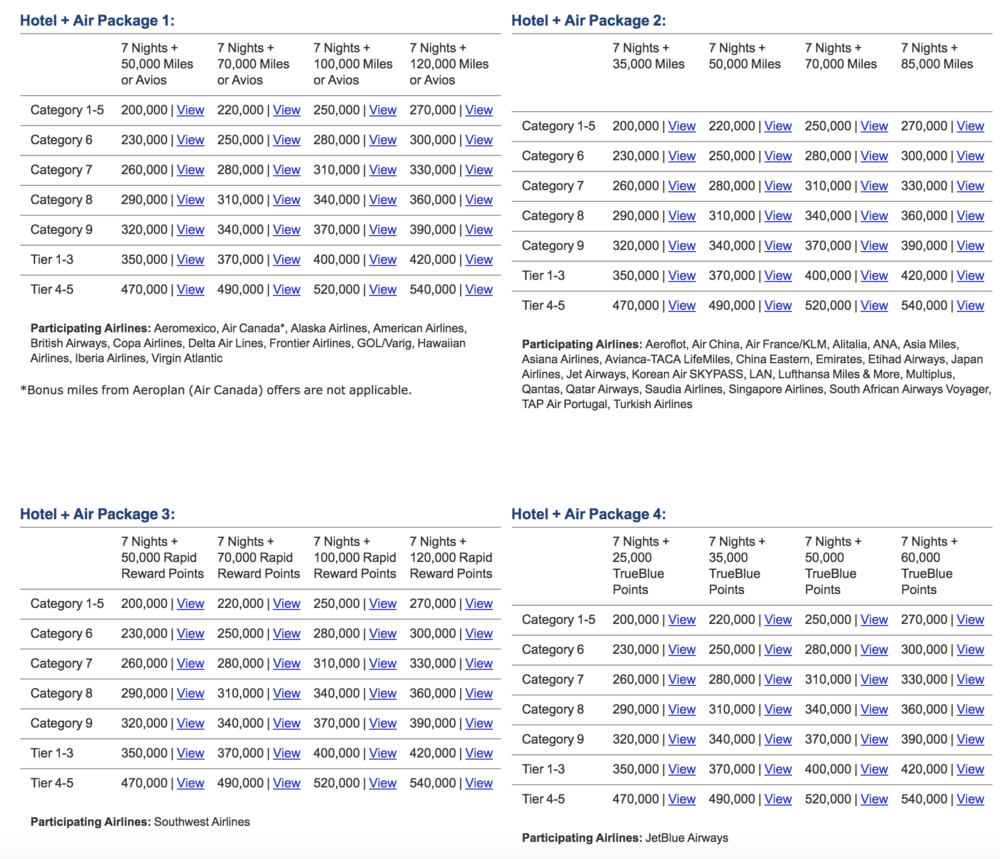
The four separate charts are used for different sets of airlines, with Package 1 being the most lucrative, both in terms of how many airline miles you received and the relative utility of these airline miles (for most North American travellers, Air Canada Aeroplan or Untied MileagePlus is a whole lot more useful than Turkish Airlines Miles+Smiles). Package 2 allowed you to transfer to a few niche programs that are still pretty useful, like ANA Mileage Club, albeit for a lower amount of airline miles.
Note that in each matrix, the furthest-right column (120,000 miles in the case of Package 1) gives you the most bang for your buck. Furthermore, due to Marriott’s partnership with United Airlines, you get a 10% bonus when redeeming United miles, giving you total of 132,000 miles in the MileagePlus program should you decide to go that route.
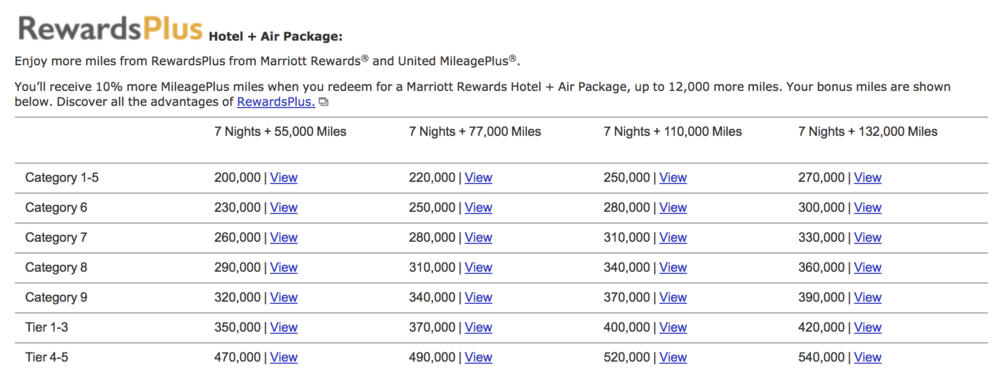
Here’s why the packages are so lucrative. For many points collectors, transferring hotel rewards points to frequent flyer accounts is a reliable way of supplementing one’s airline mileage balances in order to redeem for flights.
Before the Travel Packages came into play, the predominant method of doing this was to transfer SPG Starpoints at a 1:1 ratio, with a bonus of 5,000 points whenever you initiated transfers in chunks of 20,000 points. If you were to transfer 90,000 Starpoints, then, you’d end up with 110,000 airline miles in most frequent flyer programs.
When the 1:3 ratio to Marriott Rewards was introduced, these 90,000 Starpoints found a much better use. You could turn them into 270,000 Marriott Rewards points and then book a Travel Package, which would immediately get you 120,000 airline miles if your redeemed Package 1. That’s already an improvement compared to the 110,000 miles you’d get from transferring Starpoints directly.
And of course, the kicker was that you’d get a 7-night hotel certificate out of the whole deal as well. This certificate has to be redeemed all at once (you can’t break it into separate stays), but it’s still great value even if you only stay for 4 or 5 nights. For example, I recently used 7-night certificates for a 4-night stay at the JW Marriott Rio de Janeiro and a 7-night stay at the Marriott Moscow Tverskaya.


They Simply Had to Go
Of course, it should be easy to see that under the new program, this arrangement simply could not last.
In sorting out the finer details of the merger, Marriott promised to retain the best parts of SPG, one of which was the ability to transfer points to over 40 airlines. They’ve duly kept their word, and you’ll soon be able to transfer points from the new program to airline accounts with the same 25% bonus as before – miles will transfer at a 3:1 ratio for most airlines, with a bonus of 15,000 points whenever you initiate transfers in chunks of 60,000 points. This reflects the same arrangement that SPG had, with everything scaled up by a factor of 3.
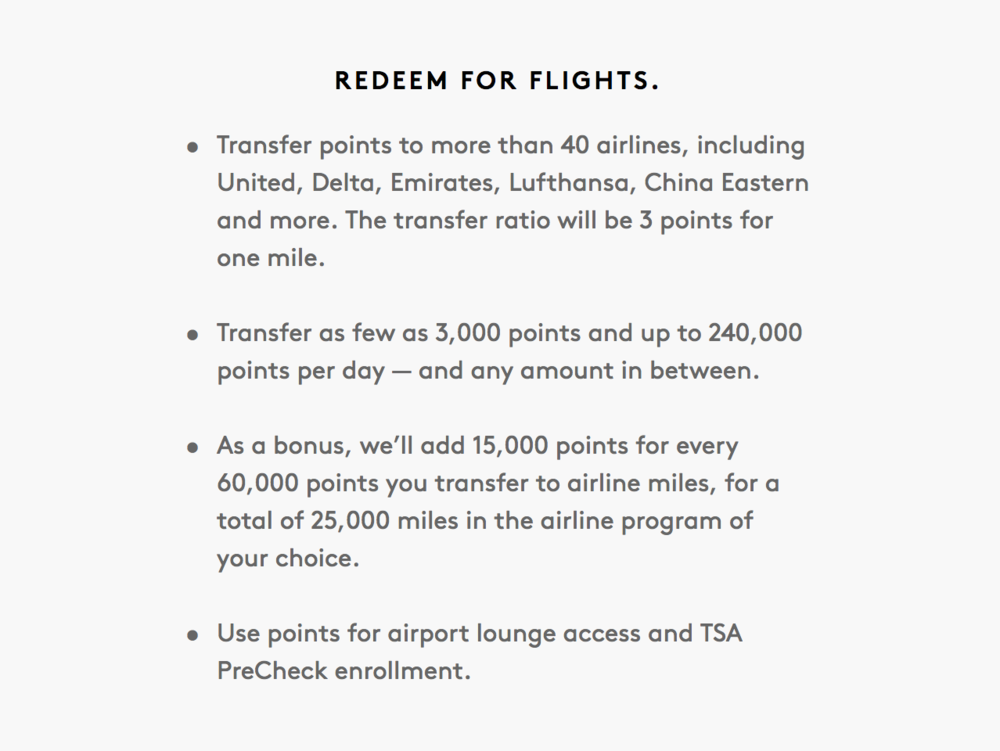
With the above being Marriott’s intended channel for most of their members to transfer points to airline miles, there was no way they were going to keep around a Travel Packages scheme that provided effectively double the value.
The overall transition from two programs into one has been characterized by a “great equalization” of sorts. Differences in the relative generosities of the two programs are being smoothed out, and the Travel Packages was one of the most egregious examples of this, so it’s no wonder that they’re going away in their current form.
If you’re trying to decide whether a last-minute push for a Travel Package makes sense for you, ask yourself whether you have any use for 120,000 airline miles in the program of your choice, and how much more you’d value those miles over what you’d otherwise redeem with 90,000 Starpoints. If you’d indeed value the airline miles more than the alternative, go for it, since we won’t see a better conversion method in a long, long time. Of course, the 7-night hotel certificate also comes into play, but as we shall see, things aren’t so straightforward there…
The New Travel Packages
Details on the new edition of Travel Packages are published on the same mini-site that shows the new hotel categories, and it suffices to say that they don’t look quite as pretty.
Early on after the merger was announced, Marriott had confirmed that the Travel Packages would stick around, though perhaps in a modified form. At the time, loyalty executives had identified the previous rewards chart (four different redemption matrices for various airlines) as being overly complex and wanted to unify things into a singular chart for all airlines.
That in itself isn’t a problem, though like I mentioned earlier, the subtext of “in a modified form” was always that the outsized generosity of the Travel Packages needed to be reined in, and that’s exactly what’s happening – after August, we’ll need more points to redeem for packages that will grant us fewer airline miles.
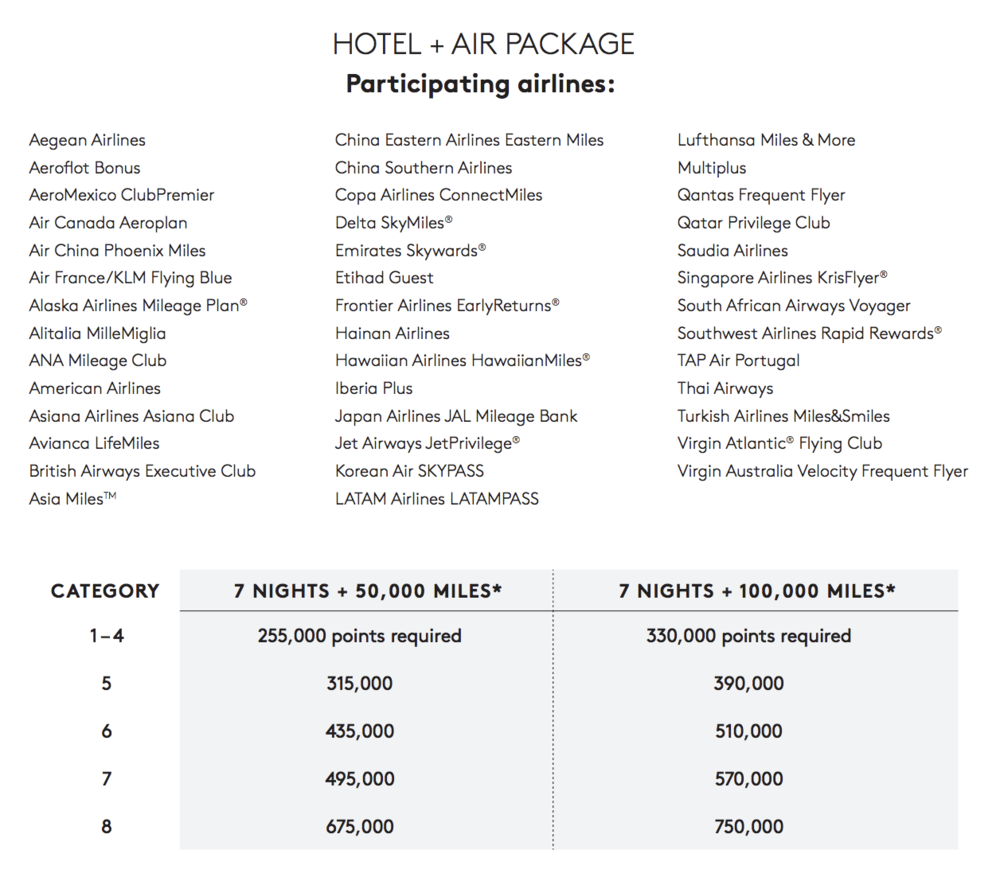
As you can see, the new redemption grid now caps out at 100,000 airline miles, a 17% reduction from the old maximum of 120,000 miles. (Redeeming for United MileagePlus still grants you a 10% bonus, giving you 110,000 miles in total.) Furthermore, the points required for a 7-night certificate at various hotel categories are increasing dramatically.
Let’s compare the old Category 1-5 row to the new Category 1-4 row, which is as close to an apples-to-apples comparison as we can get (both the old Category 5 and the new Category 4 require 25,000 points per night at the standard rate). Previously, 270,000 points would get you a 7-night hotel certificate in this category, plus 120,000 miles. Now, 330,000 points (a 22% increase) would get you a 7-night hotel certificate in this category and only 100,000 miles.
Assume that we fully utilize the 7-night certificate, and therefore value it at 150,000 points (25,000 points x 6, taking into account the usual Fifth Night Free benefit). Then, the old effective transfer ratio from hotel points to airlines would be 120,000 points (270,000 – 150,000) into 120,000 miles – a 1:1 ratio. The new effective transfer ratio would be 180,000 points (330,000 – 150,000) into 100,000 miles – a 9:5 ratio. That’s a 44% reduction in value!
A similar story takes place all over the redemption grid, with value being slashed across the board. Even niche programs like ANA Mileage Club and Korean Air SKYPASS, which were previously available at an unfavourable rate as part of Package 2, are still getting less lucrative – just to a smaller extent compared to the extreme sweet spots of the old Package 1.
The only positive is that the 7-night certificates issued from the new Travel Packages will now be redeemable at a much wider selection of properties, now that the Starwood hotels have been incorporated into the singular award chart. Indeed, a Category 8 certificate – if you can afford it – could land you a week at some of the best hotels in the world.

To sum up, here’s a rundown of the changes to the Travel Packages:
-
The four separate redemption grids for different airlines are being combined into one; JetBlue is no longer one of the participating airlines, while Aegean Airlines, China Southern, Hainan Airlines, Thai Airways, and Virgin Australia have been added
-
All things being equal, the amount of points required to redeem a Travel Package is increasing
-
All things being equal, the amount of airline miles you get from redeeming a Travel Package is decreasing
-
The 7-night hotel certificates are now redeemable at a wider range of hotels
After August, redeeming a Travel Package will only make sense for those of you who fully intend to stay at a hotel for seven nights, have a use in mind for the 100,000 airline miles, and most importantly, possess enough points to even afford one in the first place. Ultimately, these changes are necessary from Marriott’s point of view, but nevertheless very disappointing to those of us who’ve been enjoying this sweet spot.
What’s Happening to Existing Certificates?
There’s one more detail that bears contemplation, and it’s a very important one. Soon after the new program was announced, I had identified one of the outstanding questions to be the issue of what happens to existing 7-night hotel certificates that are sitting in members’ accounts.
After all, out of the members who are scrambling to redeem Travel Packages before the changes go into effect, many might not have an immediate use for the hotel portions of the package. Normally, you have one year to apply the certificate to a reservation, but with the upcoming changeover and the transition to a new set of hotel categories, what’s going to happen?
The answer is that we simply don’t know. Marriott hasn’t communicated anything about this to its members, much to the frustration of those who currently hold unattached certificates (such as myself).
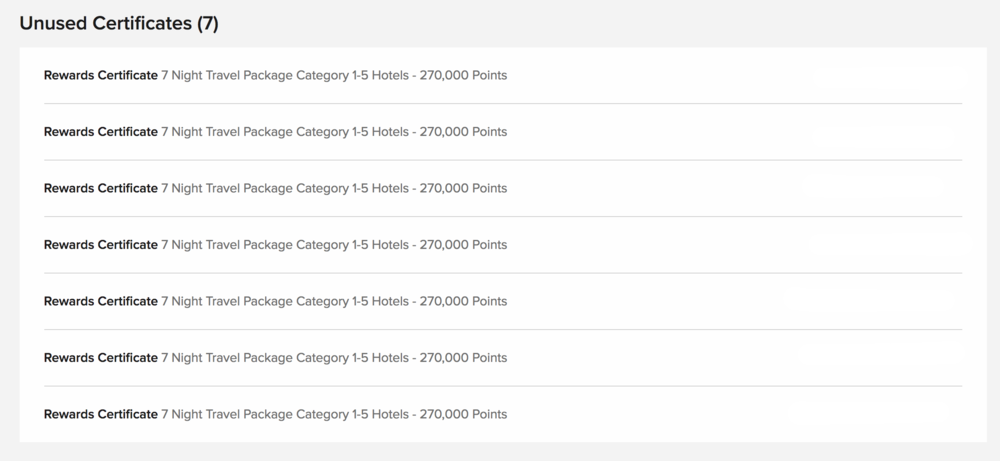
I try to keep speculation to a minimum on this blog, so I’ll direct you to this FlyerTalk thread with all sorts of colourful ideas on how Marriott will treat these certificates.
In short, the best-case scenario seems to be that Marriott will simply allow the certificates to map onto the new categories; in this case, a current Category 8 certificate would be valid at new Category 8s as well, which would unlock all 6,500+ hotels. The question in this scenario is what happens to existing certificates for Category 9, Tiers 1-3, and Tiers 4-5.
The worst-case scenario seems to be that Marriott will cancel the certificates for their “residual value”. This is the amount of points you get back (in the current program) if you decide to trade in your certificate for points. Right now, if you were to call Marriott and request this, you’d get a pitiful 45,000 points back for a 7-night Category 1-5 certificate, with 30,000 extra points for each “step” above Category 1-5. That’s peanuts compared to the value of the certificate if applied to a reservation, and it’s effectively penalizing you for changing your mind. The pessimistic speculators seem to think that Marriott may just void all outstanding certificates, deposit the paltry “residual value” back in your account, and call it a day.
Both of those extremes are considered unlikely, as they would either cost Marriott a lot of money or deeply aggravate the members who currently hold unattached certificates. Therefore, a middle-ground solution – perhaps the remapping of categories to the new scheme, or a straight refund of points at the true value of the certificates – is potentially on the table. But again, we simply don’t know what’s going to happen.
That means that any strategy as it relates to these hotel certificates will have to be a probabilistic one. Decide for yourself: how likely is it that Marriott will resolve the unattached certificates in a consumer-unfriendly manner, like cancelling them for their residual value? For me, based on the fair and respectful way they’ve conducted themselves throughout the merger so far, my educated guess is that the likelihood is low. Thus my strategy will incorporate the fact that no matter what happens to the hotel certificates, I’m still likely to get a fair deal out of redeeming a Travel Package at this time.
Indeed, we know that the current Travel Packages represent one of the best ways to acquire airline miles in a program of your choice, and I’ll always have a use for these miles. Therefore, I intend to load up on Travel Packages in order to maximize this opportunity before it’s gone.
I’ll probably diversify my hotel certificates among the different categories, just in case certain categories end up being treated more favourably than others. And I’ll likely aim to complete these redemptions as close to July 31 as possible, in case information gets released beforehand that might change the analysis.
Conclusion
The Marriott Travel Packages had a tremendous run of being one of the standout redemptions in the Miles & Points world in the past few years. It’s an excellent example of the perhaps unintended consequences of the constant shakeups in the world of airlines and hotels. Marriott probably didn’t mean for so many people to have easy access to this sweet spot, but we were alert to it since Day 1 of the merger being announced and have been taking full advantage. With the August transition looming, now’s the time to scrape together the points for a current-edition Travel Package and give it one last hurrah.




















I guess the best deal is Hotel + Air Package 1 / Cat. 1-5 / 7 nights and Alaska Miles ?
I’d say if you have to choose a frequent flyer program at random, then Alaska miles would be the best choice. After all, they are a lot tougher to come by than Aeroplan miles. And yes, by choosing the Cat 1-5 Package 1, you’re getting the best value for money, unless you have a specific redemption in mind for another category.
Hi Ricky,
Called Marriott today and they couldn’t find Aeroplan as one of the redemption partners. How do I go about making this redemption to Aeroplan?
Marriott seems to have a lot of incompetent agents lately. Try telling them to look for Air Canada?
Hi Ricky,
Thanks for all the super useful info. Have a quick question – I am looking to redeem a Marriott travel package and wondering which category to redeem for. My options:
1) I have enough points for 120,000 miles + a 7 nights Cat 7 hotel certificate.
2) OR I can transfer around 16,000 MR to SPG and then to Marriott to reach the points requirement for a 120,000 miles + 7 nights at Cat 8 hotel certificate too.
3) OR I get 120,000 miles + 7 nights at Cat 1-5 hotel.
Personally, I don’t have an immediate redemption in mind and would like to wait before applying the certificate. Or I could apply now towards a hotel in Hawaii or something for next year and then plan around it. I know there is no clarity on what would happen to the hotel certificate post Aug 1st, but I’ve read that the best value now is to go for the higher category certificates like cat 7,8,9.
Any suggestions on which category package will be the best redemption? Either if I want to apply the ceritificate now and plan something around it, or take a wait and watch gamble.
Appreciate the help and input.
Thanks!
At the end of the day it’s going to be a gamble. On the off-chance that Marriott allows Old Cat 8s to become New Cat 8s, your new Cat 8 certificate will be able to get you some of the best hotels in the world.
There’s also no downside to getting a Cat 8 in hopes of that outcome. If they do a points refund instead, you’ll get the incremental points back in your account.
The only question is whether you’d have other uses for the incremental 90K points between a Cat 1-5 and a Cat 8, and how quickly you can replenish your points balance.
In any case, getting a package of any kind is better than not getting one at all, given the incredibly generous ratio for the airline miles.
Jian, he is the Prince and we are mere mortals.
I actually hope to get one certificate in place
in the time alloted.
Perhaps so…
To me, I could not use that many certificates…
What do you think Ricky? Transfer some MR to SPG to take advantage?
Definitely advantageous if you have uses in mind for the airline miles (most important) and the hotel certificate (in particular, if you’re able to apply the certificate to a reservation before August). If you don’t have immediate hotel plans, the uncertainty regarding the future of the certificates will be something to think about, as I mentioned in the article.
Remember that you don’t have to use the hotel stay for all 7 nights – you can use it for a 4- or 5-night stay, and it would still be worthwhile.
Oh, my god! How can you accumulate that many points? Ricky!
You sound like my dad 😉 Essentially, it’s the result of relentless application of the principles in this article: https://princeoftravel.com/blog/2018-miles-points-action-plan
Being a blogger does help with #2 for sure.
Running a blog helps maximizing referrals, annually 😉
Even though, I can’t imagine that many points!